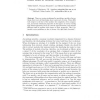Free Online Productivity Tools
i2Speak
i2Symbol
i2OCR
iTex2Img
iWeb2Print
iWeb2Shot
i2Type
iPdf2Split
iPdf2Merge
i2Bopomofo
i2Arabic
i2Style
i2Image
i2PDF
iLatex2Rtf
Sci2ools
102
Voted
DLOG
2009
2009
Which Kind of Module Should I Extract?
Abstract There are various techniques for specifying a module of an ontology that covers all knowledge about a given set of terms. These differ with respect to the size of the module, the complexity of its computation, and certain robustness properties. In this paper, we survey existing logic-based approaches, focus on syntactic approximations, and compare different kinds of modules with respect to their properties. This is intended to give guidelines on how to choose "the right kind of module".
Automated Reasoning | Certain Robustness Properties | DLOG 2009 | Syntactic Approximations | Various Techniques |
Related Content
| Added | 09 Nov 2010 |
| Updated | 09 Nov 2010 |
| Type | Conference |
| Year | 2009 |
| Where | DLOG |
| Authors | Ulrike Sattler, Thomas Schneider 0002, Michael Zakharyaschev |
Comments (0)

